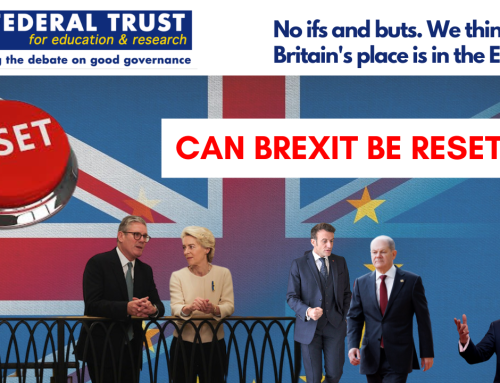
by Roger Casale
Founder, Secretary General & CEO, New Europeans
21st April 2020
“The plague was posting sentries at the gates and turning away ships bound for Oran.” Albert Camus, (1913-1960)
“Human it is to have compassion on the unhappy” Giovanni Boccaccio (1313 – 1375)
Plague has been with us since ancient times. Pestilence has left its mark on our folklore, in art and in literature, on our collective memories and on the habits that still shape how we live today.
What is unusual about Covid-19 is that it is a truly worldwide phenomenon – a pandemic. Even the Spanish flu, the deadliest in history, only reached one third of the world’s population (although it still killed 50 million).
The impact of the virus will be a shared global experience, but the way we respond will vary region by region.
One of the key variables will be the values which prevail in different societies at the present time. Or to put it another other way, how nations respond to the coronavirus will tell us much about their identity.
Identity is a complex issue because we all belong to different groups, many of which overlap. Which of these multiple identities matters at any one time will depend on context.
In an emergency, none of those cross-cutting, particular identities seem to matter as much as before. We can all catch the virus and infect others. Black, White or Asian; Christian, Muslim or Jew. What matters most, what marks us out and gives us a sense of belonging, are our values.
Dominic Raab, British Foreign Secretary, used the expression “coronavirus is a great leveller” in a press conference he gave as Deputy Prime Minister and was promptly ridiculed for doing so.
Everybody knows that death is a great leveller. What people had wanted to hear from a Government spokesman was that Britain is united, they wanted a message for all people living in Britain. A message that said we will stand or fall together. That message has to do with values.
In the midst of this crisis, tough choices will be faced by doctors and healthcare workers as well as by politicians about who will live and who will die. Who takes those decisions? What criteria should they use? How do we hold the decision-makers to account?
British Government has prevaricated about that. It is also clear that it failed to secure the medical equipment and protective clothing necessary to prepare an adequate response.
How was it possible for a government to fail with such catastrophic consequences? Was this just incompetence? Or has there been a deliberate, albeit misguided attempt to protect the economy at the expenses of the “lives of a few pensioners” (Dominic Cummings)?
Even as the death toll in the UK passed 15,000, Michael Gove, Chancellor of the Duchy of Lancaster felt able to reassure viewers of the Sophy Ridge show on Sunday, 19 April that the Prime Minister (at least) “is in good spirits”.
If the British Prime Minister is in good spirits it is unlikely this can in any way relate to his government’s handling of the coronavirus crisis. By delaying his response, he has taken that crucial decision about life and death on himself.
It is a credit to the new Labour leader Sir Keir Starmer, that instead of seeking to exploit this failure politically, he has offered to share the leadership role so as to deal with the health crisis more effectively.
Leadership is driven by many factors but key among those especially in times of trouble are the values that a leader articulates and the extent to which those values resonate with his or her followers.
In the Prime Minister’s absence, a 99 year old veteran Captain Tom Moore, set off on a hundred laps of his garden to raise money for the NHS. At the time of writing Captain Tom has already raised £25m.
With simple actions, rather than a cascade of esoteric words and meaningless references from Boris Johnson, Captain Tom has reminded Britain of what really matters – public service, a willingness to put your life on the line, and unflinching commitment to the public good.
Captain Tom’s values are the values of Britain and he has single-handedly galvanised a sense of solidarity as surely as if he had made the whole nation stand up against an electric fence.
The weekly “clap for carers” which has taken off on streets around Britain is a reminder that the NHS is the personification of solidarity and a symbol of national unity.
It marks a shift in the public mood. It will impact and may reframe all of the key political issues which the UK has grappled with over the last ten years, including the issues of migration, Britain’s relationship with Europe and the role of the state.
From one day to the next, many EU citizens have gone from low-skilled, migrants to essential key workers on whom the lives of our loved ones depend. Who believes that after the crisis is over, that the UK can return to an anti-migrant rhetoric, bordering on racism, which goes unchallenged?
Britain may have walked away from its EU neighbours but that should not disguise the fact that the British still value solidarity very strongly. It is a value that is shared widely in Europe.
In fact the response of the British public can tell us much about our shared European identity – an identity that goes well beyond the territorial borders of the European Union.
In her first television address about the virus, Angela Merkel stressed that each and every life was to be valued, echoing references to the innate dignity of human life which can be found in the European Constitution.
Emmanuel Macron, in an interview with the Financial Times, said that for the first time, state and society “have put the value of human life above that of the economy”.
Not for Merkel or Macron the notion that there can be any trade-off between the battle to save human lives and the economy.
Not for Merkel or Macron, the idea that there can be a way to choose between the value of the life of the old and the young.
Not for Merkel, or Macron, the pretence that they could speculate about “herd immunity” when the lives of their populations were at stake.
These life and death questions were answered decisively by European leaders at the start of the crisis and have framed their response ever since.
Of course there have been regional variations, in accordance with member states legal systems and traditions.
Germany has relied on the calm authority of Angela Merkel, who is also a scientist by profession, to communicate with German citizens. In Italy, local mayors have been at the forefront of the communication strategy. But everywhere the message has been the same: “Every life counts”.
Across Europe, as in the UK, there has also been an extraordinary outpouring of love for our fellow human-beings. This has manifest itself across communities, regions and generations as the whole of Europe has gone into lockdown to fight the virus.
Paradoxically, the core value of solidarity, which is the soul of the NHS, has been less in evidence between member states. Italy, the first to suffer an outbreak of coronavirus in Europe, waited two months before equipment and protective clothing started to arrive from other parts of the EU.
The slow response was partly due to the fact that the delivery of health services is still organised on a national basis, as opposed to issues such as environmental policy which are decided supra-nationally.
However, it has also been the result of a lack of political leadership both by the institutions and the member state governments, despite the shared commitment to saving lives at all costs. When it comes to solidarity within the EU, public opinion has run ahead of public policy.
This issue is coming to a head around the issue of corona bonds. Although the Eurogroup (EU Finance Ministers of member states that form part of the Euro) has proposed a rescue package of half a trillion euros for the European economy, Eurobonds are unlikely to feature.
It is possible that the failure to introduce a measure which can separate the additional debt which member states in Southern Europe will need to finance in a way which keeps it completely separate from existing government debt may break the European Union.
Right wing populists such as Matteo Salvini and Giovanna Melandri in Italy and Marine Pen who have been looking forward to that moment for many years will be rubbing their hands in anticipation.
Such deep fissures have been running deep through the Council of Ministers for many years but they were disguised by the apparent unity that was on show all the time the negotiations around the UK’s withdrawal from the EU were ongoing.
During those negotiations, the EU remained steadfast and united in its approach. Much use was made of the expression “the integrity of the European model”, a model based on the four pillars of the single market, including freedom of movement of people.
With the Schengen zone suspended, national borders restored, ports and airports closed, what is left of that European identity based on the four freedoms?
With the Polish government flouting decisions of the European Court of Justice, with Viktor Orban shutting down opposition and passing laws by decree which strip Hungarians of civil rights, what is left of a European identity based on respect for democracy and the rule of law?
With the news that the last rescue mission still active in the Mediterranean has had to suspend operations, what remains of the idea of a Europe as a safe space in which human rights are respected and protected?
Solidarity is at the heart of what it means to be a European. It defines the European way of life and the European approach to community. It is not a word that is used very often in America, where the individual reigns supreme and competition is a public good as much as an economic necessity.
Therefore the failure to better co-ordinate the healthcare response in Europe has tested our common European identity to the limits.
How this plays itself out will depend on the European Union finding a way to deal not just with the coronavirus but also with the political epidemics breaking out in Europe – the rise in populism, declining respect for the rule of law, attacks on civil rights and democratic values and practices.
Most challenging of all will be the need to relaunch the European economy once the lockdown has eased.
If the EU has re-discovered the value of solidarity in the midst of this crisis and can put that principle to work in the next phase of European construction then it has every prospect of surviving. If not, it may discover the fragility that comes from outliving its favoured era.
Ironically, the UK may also discover, in the hour or its leaving, that like the rest of Europe, it also has the spirit of solidarity not just embedded in the architecture of the National Health Service but deeply embedded in the DNA of its citizens.
In both cases, it has never been more important for citizens to speak out, to demand change, and to remind leaders of our values – the values that have framed the European democratic space since the French revolution: freedom, equality, solidarity. These must be at the heart of a political vision for beating the coronavirus and emerging strongly from the crisis.






